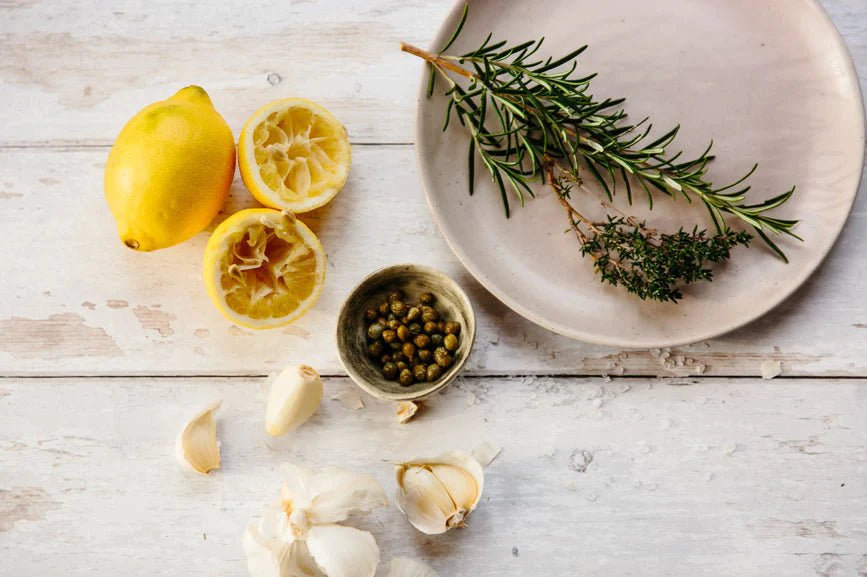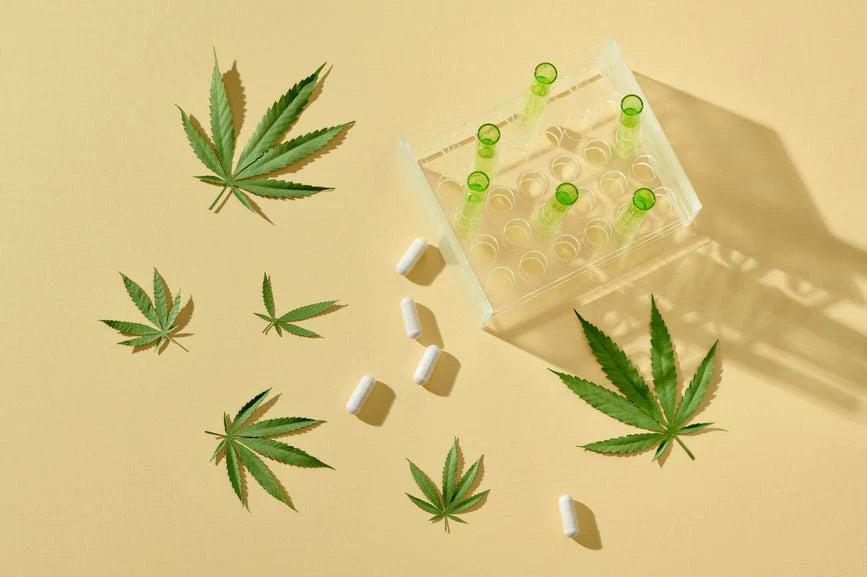
What Do Cannabis Flavonoids Do?

One of the most fascinating aspects of cannabis is the massive number of compounds it contains. Most of the focus remains centered around cannabinoids and terpenes, though, with other cannabis compounds hardly ever getting their fair share of attention.
In this guide, we’ll set things right by providing a thorough overview of flavonoids — what they are, what they do, and why they’re the most underestimated type of compound found in cannabis. Why does it matter if your cannabis products contain flavonoids? Find out by the end of this article.
What compounds does cannabis contain?
Altogether, Cannabis sativa consists of hundreds of different compounds, spread across its buds, leaves, branches, and roots. Cannabis science mainly focuses on the compounds found in the seeds and buds of the plant, however, with cannabis buds being the part of the plant that contains the most fascinating compounds.
With a microscope or even a magnifying glass, it’s possible to zoom in enough on the glittering crystals covering the surface of cannabis buds to realize they aren’t crystals at all. Instead, they’re tiny, mushroom-shaped sacs of oil called trichomes, which glisten in the light just like precious stones.
These trichomes contain the active components in cannabis — cannabinoids, terpenes, and flavonoids. Each class of compounds is different from the other with cannabinoids receiving the most attention specifically within the context of cannabis. Cannabinoids are exclusive to cannabis, but terpenes and flavonoids are also found elsewhere in the plant kingdom.
Where are cannabinoids, terpenes, and flavonoids located in cannabis?
Except in trace amounts, cannabinoids, terpenes, and flavonoids are exclusively found in the trichomes that emerge on the surface of maturing cannabis buds during the flowering phase. There are hardly any trichomes present on cannabis leaves aside from so-called “sweet leaves,” which are the small, crystal-coated leaves located near the bases of buds.
What are flavonoids?
Flavonoids are a diverse array of compounds that can be responsible for the flavor, aroma, or even appearance of both plants in nature and flavonoid-infused products. Unlike terpenes and cannabinoids, which are oil-soluble, some flavonoids are water-soluble — while some, on the other hand, are oil-soluble like the majority of cannabis compounds.
In the cosmetics and food industries, flavonoids are commonly used for a variety of different purposes. Recently, flavonoids have received more scientific attention as light has been shed on their potential ability to offer therapeutic as well as aesthetic benefits.
What’s special about flavonoids?
The benefits of flavonoids are usually judged in contrast with terpenes, and it’s true that significant differences exist between the compound categories. Perhaps what’s most interesting about flavonoids, though, is the fact that they often appear to offer many of the same benefits as terpenes while sometimes being considerably less volatile or even water-soluble.
Terpenes, for their part, have long been renowned for their ability to offer anti-inflammatory and antioxidant benefits in addition to tasting and smelling excellent. For all their benefits, terpenes are limited by their volatility, and they can be tricky to mix into non-lipid product formulations.
Flavonoids are also powerful antioxidants and anti-inflammatory agents, and some even seem to offer benefits that closely mirror but go above and beyond those of comparable terpenes. It is for these reasons that scientists are increasingly taking flavonoids seriously and shoppers are beginning to demand that their cannabis products contain not only terpenes but flavonoids as well.
What is the difference between terpenes and flavonoids?
Terpenes and flavonoids are very similar, but much wider variance is present between individual flavonoid compounds compared to the differences between terpenes. Some flavonoids have pigmentation properties, for instance, while others don’t. Certain flavonoids are water-soluble, but others are lipid-soluble.
Overall, flavonoids are the more diverse category of compounds with terpenes generally bearing greater similarities to each other. It should be remembered that, even if the two categories of compounds are not the same, terpenes and flavonoids are more similar to each other than they are different.
Do cannabis products contain flavonoids?
Very few cannabis products are specifically designed to include flavonoids, but many contain these compounds anyway. Flavonoids can be damaged or removed in the process of making cannabis extract, but it’s just as possible to preserve these beneficial compounds — either accidentally or on purpose.
The types of cannabis products that are most likely to contain flavonoids are listed as “full-spectrum.” Broad-spectrum cannabis and hemp products also sometimes contain flavonoids, but they can be burned off in the purification process. Isolate cannabinoid extracts do not contain any flavonoids at all, and they also don’t contain any terpenes.
What is full-spectrum cannabis extract?
Full-spectrum cannabis extract is a relatively unprocessed form of cannabis concentrate that still contains most or all of the compounds naturally found in Cannabis sativa flower. In addition to containing the “full spectrum” of cannabinoids present in cannabis, full-spectrum extract also contains terpenes and flavonoids, making it both more delicious and more potent than other extract types.
What is live resin extract?
Live resin is a special type of full-spectrum extract that has been prepared using a method that specifically does not damage the terpenes or flavonoids present in cannabis flower. If you are seeking the type of cannabis product that contains the most flavonoids, you’ll do best with a live resin product. If you aren’t sure whether a cannabis product contains live resin extract or not, check the packaging, read the product’s lab reports, or contact the company.
How to know if your cannabis products contain flavonoids
What do you do if you can’t tell whether a cannabis product you’re interested in contains flavonoids? Here are three simple steps to follow:
Product description
Start by taking a look at the product description. Largely due to lack of consumer awareness regarding their benefits, most companies don’t yet make a point of flaunting the flavonoid content in their products. Watch for catchphrases like “full-spectrum” or “live resin,” however, which at least give you a general idea of whether a cannabis product contains flavonoids or not.
Lab reports
From there, you can check lab reports for names of specific flavonoids. Some cannabis product lab reports will contain a separate section for flavonoids, but others will include flavonoids in a list of terpenes.
Customer support
If you still can’t tell if a cannabis product you’re considering trying contains terpenes or not, contact customer support. This will also give you a chance to judge the trustworthiness of the company based on how their customer care professionals respond.
Top 5 best flavonoids
Which flavonoids should you keep an eye out for in cannabis products? Here are five of the most well-known and beneficial compounds in this category:
Quercetin
Commonly sold as a supplement on its own, quercetin is also found in many phenotypes of cannabis. Quercetin is believed to have a variety of anti-inflammatory and cardiovascular benefits.
Anthocyanin
The compound that makes blueberries blue (or, rather, sort of purplish), anthocyanin is also beloved for its powerful antioxidant properties.
Myricetin
Believed to have valuable immunological effects, myricetin is found in many plant species, including cannabis.
Fisetin
Providing the yellow or ochre color in many plants, fisetin is also believed to have DNA-protecting benefits.
Hesperetin
Present in lemons and oranges, hesperetin helps with oxidative stress and protein expression at the cellular level.
Why cannabis is better with flavonoids
Flavonoids are a core component of Cannabis sativa’s active compounds, and removing them from the equation has the potential to limit the benefits of cannabis in ways we don’t even understand. Cannabinoids have been observed to be more powerful when used in conjunction with the other natural compounds found in cannabis, providing reason enough to pay closer attention to the flavonoid content in your cannabis products.


